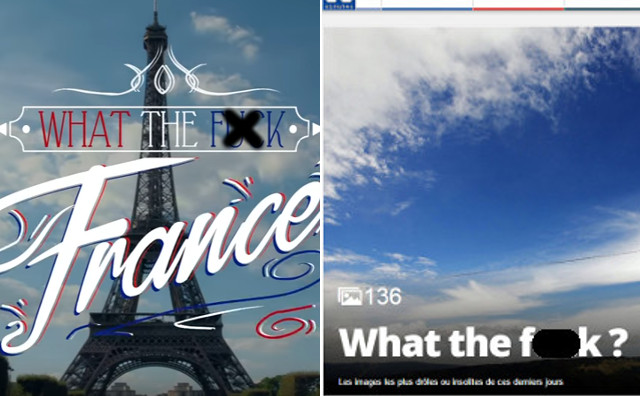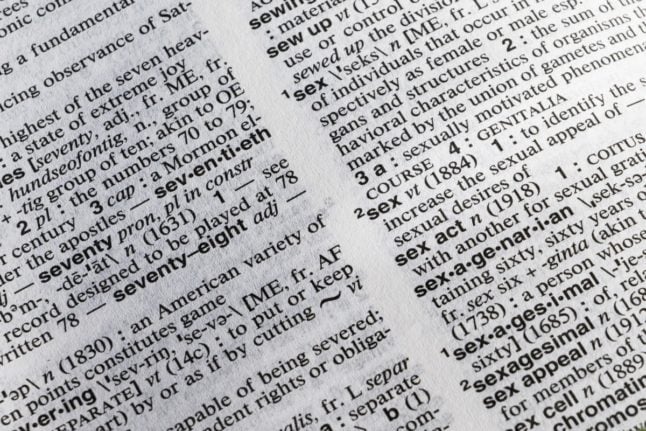“Fuck” is a common word in France and it’s not just because of the hordes of Brits and Americans living here.
The locals appear to use it in conversation as much as English-speakers do and often even more.
The young and trendy French people aren’t afraid to say it, the English-language TV shows (when they’re not dubbed) aren’t censored, and you can hear expletive-laden rap songs played virtually everywhere and one French juice company even included it on the bottle of a drink marketed at schoolchildren.
Interesting back to school supermarket juice for kids (zoom in) 🤔 pic.twitter.com/qE41mRT5OR
— Claire Waddington (@clairewad) September 10, 2021
French media are also keen on it – TV station Canal Plus had a weekly programme called “What The Fuck France!” while a regular section of the 20 Minutes web site – showing funny and unusual pictures from around the world – was also called “What the fuck” and you can regularly see the word in newspaper headlines.

One of the reasons why the French seem to use the word so much is that they just don’t get the weight of ‘fuck’ in English.
While ‘fuck’ has undoubtedly become more widely used in English speaking countries in recent years, there are still plenty of situations where you wouldn’t use it, especially in anything concerning children.
‘Fuck’ is most commonly translated into French as putain, yet there is a world of difference between the two. It wouldn’t be particularly out of order to use putain in front of the elderly, nuns or even children in certain contexts – it’s really all in how you say it.
Camille Chevalier-Karfis, founder of FrenchToday.com, said the use of the word has left her scratching her head too.
“I am surprised at the use of the word ‘fuck’ in the French language, especially since it seems to me that the French don’t use it right,” she told The Local.
“Recently a friend sent me an email about her elderly mother that said: ‘je ne supporte plus cette fucking mother méthode’ (I can no longer stand this despicable method my mother uses). Why did she write this part in English? Probably to show her anger, because it sounded good to her this way.
Perhaps it’s all about being cool?
For the more travelled, more connected younger generation of French people it’s trendy to work all kinds of English words into their everyday conversations, so perhaps it’s no surprise that the f-word is one of them.
Perhaps it’s from watching all those Hollywood films over the years, where the f-word has been given a softer translation when it’s subtitled or dubbed into French.
But the nonchalance towards swearing in English can perhaps be better explained by the fact that the French adore swearing in general.
Sometimes the French throw out long strings of expletives when they’re irritated, as famously highlighted in the Matrix Reloaded film (see below).
For those interested, the actor, Frenchman Lambert Wilson, says: “Nom de dieu de putain de bordel de merde de saloperie de connard d’enculer ta mère”.
A rough translation would be: “Godforsaken whore from a piece-of-shit arse brothel – go and bugger yer mother”.
Indeed.
The French are just a bit more liberal with cursing than the Brits or the Americans, similarly to how they’re more liberal with their sex and nudity on TV.
Yes, the French are a liberal bunch and don’t mind a good bout of coarse language, so you may as well get used to it too.



 Please whitelist us to continue reading.
Please whitelist us to continue reading.
Sort of like Germans adopting the word “shitstorm.” Angela Merkel even used it in a speech! I suppose it *is* a very useful word lol.
The article does not mention the origin of the word, which was not as a cuss word–it is an anagram that was widely used during a certain period in English history.
Centuries ago, when small hamlets and villages, that could not afford to to maintain a jail and instead relied on stocks and pillories where those persons in breach of the law had their legs or head and wrists locked in the stocks or pillories for passers by to throw object at them.
The crime committed by the person was written on the stocks / pillories , with a common crime being reduced to an anagram ie
FUCK meaning “For Unlawful Carnal Knowledge”. Viewed in those terms, not so offensive .
This isn’t actually true but a common misconception – a quick google search will give you the correct etymology: https://en.wikipedia.org/wiki/Fuck
As an american the only word that really disturbs me is when the British use the “C” word, and they use it for all sorts of situations. Stops me dead in my tracks all the time. I can not get over it. And its usage is all over the place from a friend to much worse. And when they combine it with cheeky, I am at a loss for words. How are threy using it!